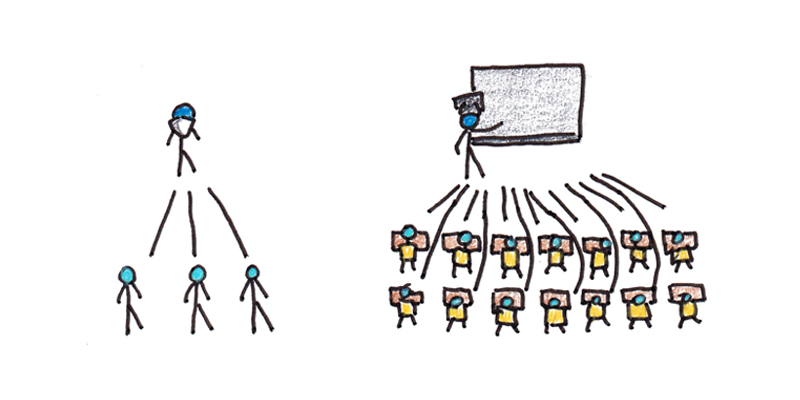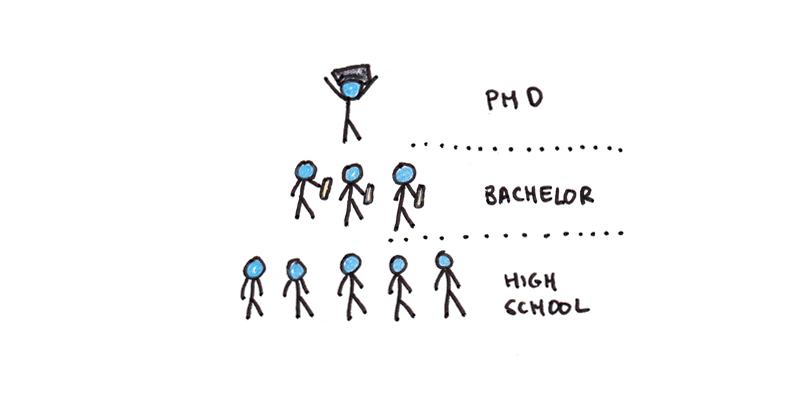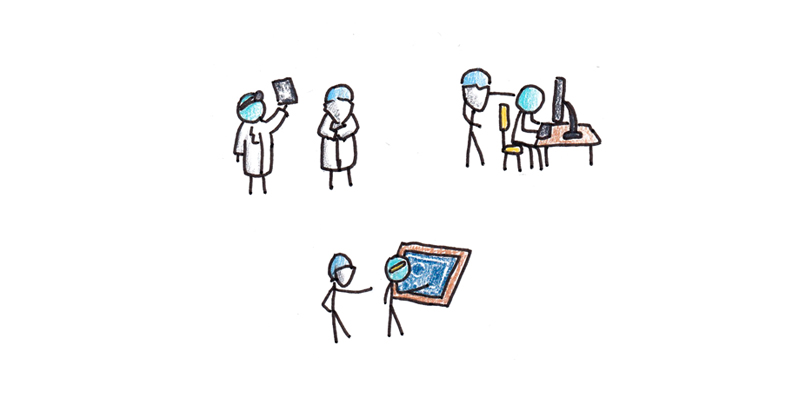I’ve argued before that we mostly learn by doing. Yet, if this is true, it creates a puzzle: why has school largely replaced apprenticeships as a mode for learning?

The common answer is that apprenticeship works great for smithing and weaving, but modern work is mental. We need years of dedicated training inside the classroom before we can perform as knowledge workers.
I believe this answer is false given that many knowledge-intensive positions employ lengthy apprenticeship-like periods. Doctors must complete a residency; lawyers need to article; and grad school for scientists is effectively an apprenticeship. If apprenticeship was only valuable for manual trades, why would it feature so prominently in elite cognitive work?
If the common answer is wrong, we need to look for other explanations.
Explanation #1: Apprenticeships are Expensive

The most straightforward answer is simple economics. It’s cheaper to sit students in a classroom than to train them on the job. This is Tamar Jacoby’s position writing for The Atlantic when he examines why Germany’s famed apprenticeship program might be hard to replicate. Costs can reach up to $80,000 per student. While the cost of higher education has soared, the fundamentals of classroom instruction remain relatively cheap.
This cost has long been a factor in deterring apprenticeship programs. Economists have long noted that this form of training suffers from a problem of credible commitment. The issue is simple: the master wants cheap labor, the apprentice wants to learn the craft.
This creates two problems: If the apprentice learns too quickly, he can run away with the knowledge inside his head, thus robbing the master of his payment. Conversely, the master may purposefully drag out the apprenticeship to prolong their access to cheap labor.
If schooling is less efficient but cheaper than apprenticing, the cost savings might explain why it has become so prominent. Of course, another explanation is that schools do more to filter than to train.
Explanation #2: Education is Mostly Signaling

Education serves two purposes. It teaches students valuable knowledge and skills. It also ranks students by their ability, conscientiousness and ambition.
The view that education is primarily the former is known as human capital theory. The view that education is mostly the latter is known as signaling theory.
If on-the-job training is essential but costly, it makes sense to consider only the best applicants. School, then, can serve an important function even if it mostly teaches useless things. Employers can reduce the risks of apprenticeship by filtering for the students who worked hardest and learned quickest.
But signaling can also devolve into escalating competition. When most people don’t finish high-school, a diploma might be enough to get a job. When everyone has a four-year degree, students may go deeper into debt to get an MA to gain a slight edge over the competition.
Explanation #3: Apprenticeships Have Declined, Learning-by-Doing Has Not

Formal apprenticeship programs may have declined, but learning-by-doing remains commonplace.
Perhaps the best evidence of this is to reflect on your own work experience. How much of what you do day-to-day was learned on the job compared to in school? Even the most stereotypically scholastic professions seem to involve enormous amounts of know-how acquired on the job.
If this is true, then the needed explanation shifts from “how do we learn what we do?” to “why do schools get most of the credit?” I’d suggest that schools often get outsized credit for skills for two reasons:
- Schools teach the highest-level, easiest to articulate aspects of a profession. These are often treated in our culture as more important than the more obscure tacit knowledge needed to effectively use them. Learning algebra is lauded, though knowing how to turn real situations into the equations so algebra can actually be performed may be much harder.
- Schools are institutionalized. Learning-by-doing is not. Thus, to the extent that formal apprenticeships have waned, we have moved our focus to education. You can vote to fund or cut education, but not learning-by-doing, which makes the role of school more salient.
From plumbers to particle physicists, most people learn their jobs by training under experienced practitioners. Our mode of learning hasn’t changed in modern times, but we often overlook it.


 I'm a Wall Street Journal bestselling author, podcast host, computer programmer and an avid reader. Since 2006, I've published weekly essays on this website to help people like you learn and think better. My work has been featured in The New York Times, BBC, TEDx, Pocket, Business Insider and more. I don't promise I have all the answers, just a place to start.
I'm a Wall Street Journal bestselling author, podcast host, computer programmer and an avid reader. Since 2006, I've published weekly essays on this website to help people like you learn and think better. My work has been featured in The New York Times, BBC, TEDx, Pocket, Business Insider and more. I don't promise I have all the answers, just a place to start.